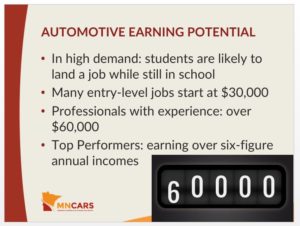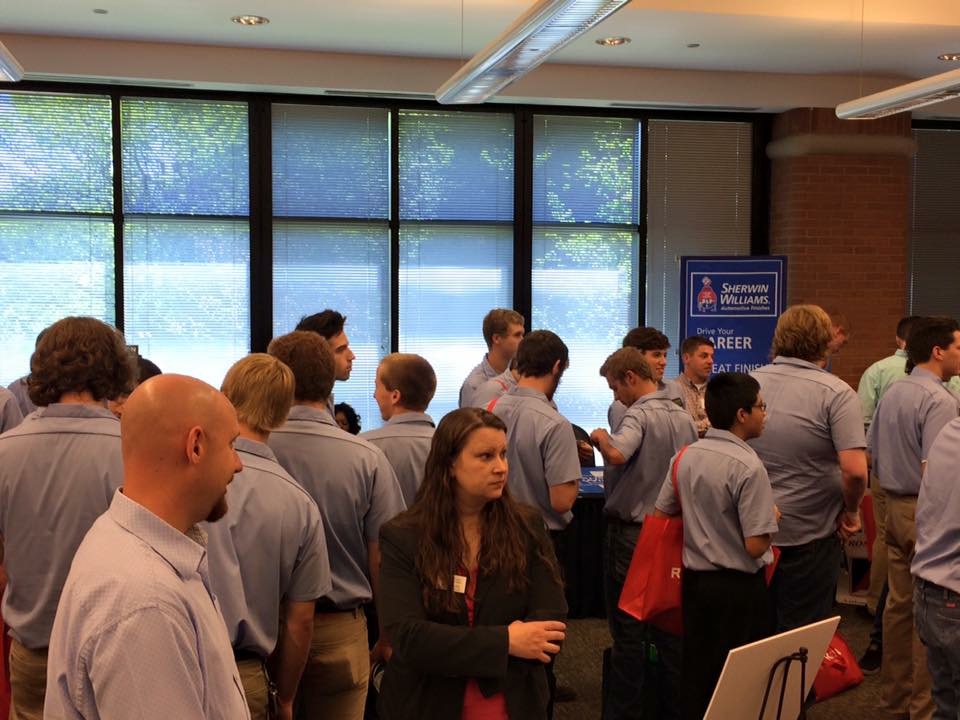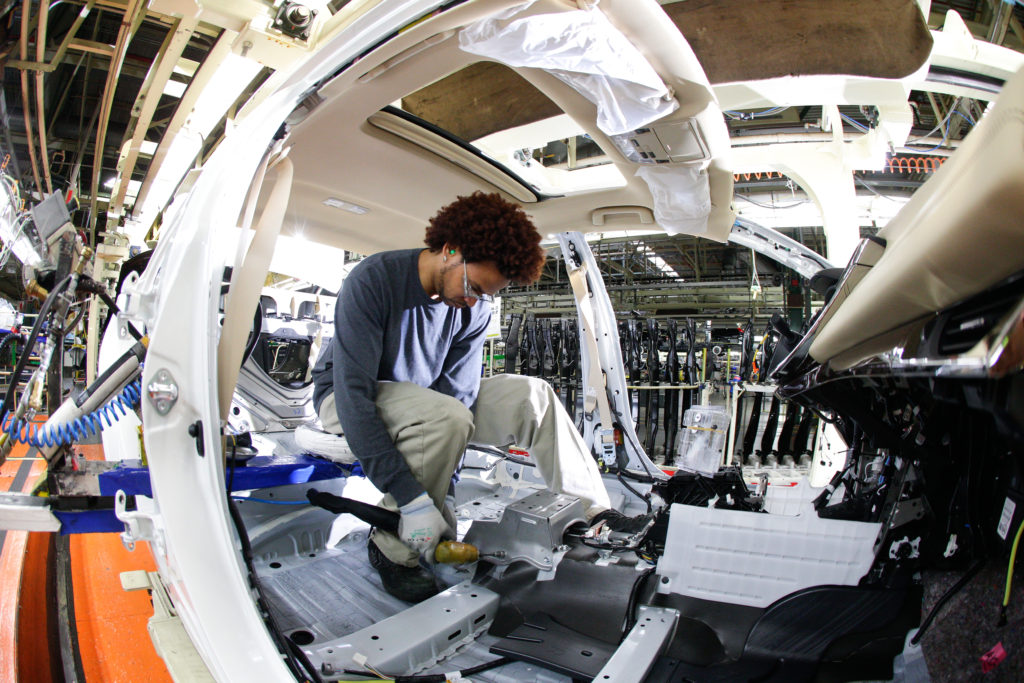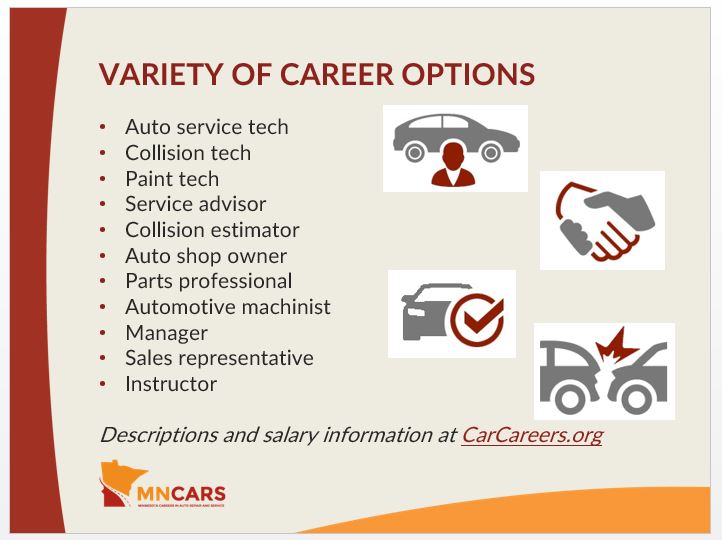
AASP-MN, CREF, manufacturers: Courting parents, counselors might aid future auto body shop recruitment
By onAnnouncements | Associations | Business Practices | Education | Market Trends
Two roadblocks to finding skilled auto body employees might be parents skeptical about their kid trying a technical career and counselors unfamiliar with what the profession offers, according to those trying to address labor shortages in collision repair — and at the OEM/Tier supplier level.
So shops readying their sales pitch to prospective entry level hires might want to spend some time preparing one to their parents and advisors as well.
Unfortunately, this could be a long-term project which requires career fair and field-trip groundwork possibly as early as elementary and junior high schools. But if your market’s employees are in their 50s — and data shows average techs are around 40 years old — it could work. You’ve got time.
Get parents and students into a (clean) collision repair venue
Collision Repair Education Foundation director of development Brandon Eckenrode noted this summer that when parents “randomly” come to the CREF career fairs — which cater to students in or about to graduate vo-tech programs — the folks are often sold.
When Mom and Dad see familiar brands like paint companies, insurers, and tool manufacturers, “a light goes on in their head” at the scope of the industry, according to Eckenrode.
That doesn’t necessarily help an independent collision repairer directly, but the seed’s been planted, and now a shop either at the fair or seeking staff has a chance to make their pitch to a more receptive audience.

Career fairs can also work to sell high schoolers on focusing in on collision repair as a career, though not all shops hire recent high school graduates. (If you do and are looking for a fair, CREF recently cut its fair rate to $1,500 for all companies and ramped the number up from 3-4 in 2015 to nearly 20 this year.)
Anecdotally, Eckenrode said CREF has heard such events are “great motivating factors.” He gave the example of one student who went, and “it got him more excited about it.”
A look inside a shop — a field trip, for example — also can help parents and youth realize that automotive fields like collision repair or painting are a decent place to spend one’s adult life. (So long as the shop’s clean — and based on what we’ve heard regarding customer marketing, corrosion and OSHA, it probably had better be.)
That concept was floated during a panel of OEMs and Tier-level suppliers at the Center for Automotive Research Management Briefing Sessions in August. Manufacturers are facing the same shortage of skilled labor at their U.S. plants, according to executives at the high-profile August conference. (Ironically, Mercedes U.S. International President Jason Hoff said the company’s factories need more repairers and diagnostics staff too, likely referring to the assembly machinery.)
Toyota Kentucky Manufacturing President Wilbert James said many people have a perception of old, “dirty, dingy” manufacturing — a perception that probably extends to automotive and service and repair as well. He encouraged his manufacturing peers to get children into the plant.
“I think they’re amazed with what they see,” James said. “I think parents are as well.”

If you’ve got that kind of clean, modern facility in your shop, it might also sell a message that collision repair indeed is “very high-tech” — a characteristic that AASP-MN Executive Director Judell Anderson has said the $250,000 Minnesota “Car Careers” initiative is highlighting. Magna Vice President Ian Simmons also said at CAR MBS that the sudden perception that “automotive is sexy” has also helped recruiting.
At a meeting of a state guidance association, counselors also recommended to Anderson and others with the Minnesota Careers in Automotive Repair and Service effort that shops offer job shadowing and a compatibility test so students can truly see if the industry is a good fit for them.
Lifestyle, stigma
Parents want their kids to succeed. So the MNCARS campaign knew “we need to overcome any resistance” from a parent concerned that their child will skip a four-year college or take a low-paying blue-collar job, Anderson said earlier this summer.
“We’re stressing that it’s very high-tech; it’s very stable in terms of economics,” she said then. Not only can a student start a career within two years and even potentially work while attending school, but “you can make a good living,” Anderson said.
Get hiring, workforce tips at Repairer Driven Education
Collision repair professionals seeking advice for how to sustain or grow their workforce should check out “Developing New Talent in a Shrinking Workforce While Reducing Labor Cost” with Charlie Whitaker of Valspar, “The Millennial Takeover: Your 5 Year Survival Guide” with Mark Claypool of Optima Automotive and “2020: The Future of Staffing – How to find, train & pay qualified people” with Mike Lanza of Sherwin Williams. The three sessions are part of the Society of Collision Repair Specialists’ Repairer Driven Education Series from Nov. 1-4 during SEMA. Register here.

The MNCARS campaign demonstrated this through a variety of financial stats and a “Mythbusters” entry on the CarCareers.org site.
Jason Hoff, president and CEO of Mercedes U.S. International, said at CAR MBS that parents were the biggest challenge to his manufacturing recruiting efforts, particularly for their perception that their child needs a four-year degree.
But they’ll make good money on the Mercedes apprentice program — and have no college debt, he argued. He said Mercedes was trying to convince school counselors, “You need to come look at this.”
Counselors
You might have had a useless guidance counselor back when you went to school, but a lot of students don’t. In fact, they’re a great resource for prompting students (and parents) to consider automotive jobs, Eckenrode and AASP-MN indicated.
On Tuesday, AASP-MN built on its plans to sell auto body repair to counselors, announcing a kit of resources to teachers and school advisers was available free online as part of the “Car Careers” initiative.

The schools kit (Get entire package here free) adds a letter to parents, PowerPoints for teachers and counselors, an automotive fact sheet and infographic, and advice for readers on why a technical career meant financial security and how to achieve that goal.
“Earning an automotive education opens the door to a rewarding career as students will enjoy lifelong skills and a variety of career paths in which they can advance their knowledge and their paycheck,” Minnesota Careers in Automotive Repair and Service Chairman and Superior Service Center owner Dan Sjolseth said in a statement Tuesday announcing the kit. “We want parents, teachers and school counselors to know how an education in the auto industry provides a pathway to an in-demand career that can take students all over the world and provide financial success.”
Collision repairers might want to target counselors for ages as young as elementary schools. Eckenrode said he attended a national conference of school advisers and had “a lot of elementary school counselors” tell him “‘We get it.'”
“They’ve come around to accepting it as an option,” he said.
More information:
Kit of collision repair career education resources for counselors, teachers
Minnesota Careers in Automotive Repair and Service “Car Careers” site, September 2016
Images
On Tuesday, AASP-MN built on its plans to sell auto body repair to counselors, announcing a kit of resources to teachers and school advisers was available free online as part of the “Car Careers” initiative. These are slides from a counselor PowerPoint presentation on the site. (Provided by Alliance of Automotive Service Providers-Minnesota)
An employee works on a Toyota Avalon at Toyota’s Georgetown, Ky., plant. (Provided by Toyota)
Students attend a Collision Repair Education Foundation job fair in Saint Louis, Mo. (Provided by CREF)
